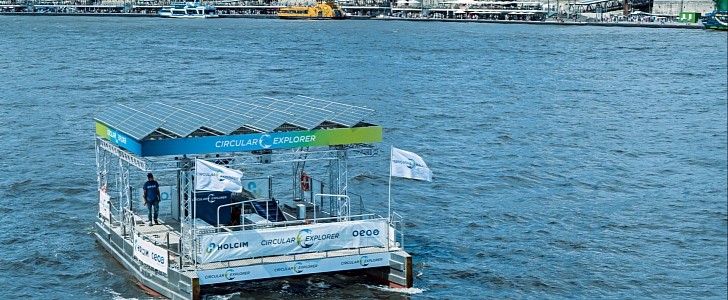Numerous green alternatives have emerged in the maritime industry, from modern sailing technology and the extensive use of solar power to green fuels and hybrid-electric propulsion systems. But what if, on top of being powered by clean energy, some vessels could also support the circular economy by cleaning up the oceans?
The entire world acknowledges the unprecedented levels of plastic waste suffocating the ocean, with a shocking statistic claiming that if nothing is done, plastic will outweigh fish in the oceans by 2050. The best chance of preventing that is a large-scale implementation of circular living, focused on the reduction of both waste and consumption.
A recently-inaugurated project aims at collecting as much plastic waste as possible from coastal areas and rivers in order to prevent it from ending up in the ocean and then converting it into new resources.
A solar-powered catamaran is at the heart of this project, developed by the cement giant Holcim together with the environmental organization One Earth One Ocean and the University of the Philippines Marine Science Institute (UPMSI). As its name suggests, the Circular Explorer will sail around coastal areas, collecting plastic waste, which will then be integrated into circular economy.
This innovative vessel, which according to Interaksyon is the first solar-powered catamaran of this kind in the Philippines, will actually have three roles. Its main job is to recover plastic waste in the Manila Bay area, resulting in up to four tons of marine litter (floating plastic) being captured per day. According to Holcim, its Geocycle waste management business then converts the non-recyclable waste into an alternative source of energy.
Secondly, the Circular Explorer is a mobile science laboratory that collects data and maps out coastal areas in regard to micro-plastic pollution, using the special sensors that are installed on board. That information is then shared with the scientific community and used as feedback for improving waste management further.
Finally, this clean energy vessel that also does the cleaning will act as an education center for the local community, together with partner institutions. As more people get involved in the clean-up operations and understand their urgency, perhaps similar projects will be launched in other parts of the world as well.
A recently-inaugurated project aims at collecting as much plastic waste as possible from coastal areas and rivers in order to prevent it from ending up in the ocean and then converting it into new resources.
A solar-powered catamaran is at the heart of this project, developed by the cement giant Holcim together with the environmental organization One Earth One Ocean and the University of the Philippines Marine Science Institute (UPMSI). As its name suggests, the Circular Explorer will sail around coastal areas, collecting plastic waste, which will then be integrated into circular economy.
This innovative vessel, which according to Interaksyon is the first solar-powered catamaran of this kind in the Philippines, will actually have three roles. Its main job is to recover plastic waste in the Manila Bay area, resulting in up to four tons of marine litter (floating plastic) being captured per day. According to Holcim, its Geocycle waste management business then converts the non-recyclable waste into an alternative source of energy.
Secondly, the Circular Explorer is a mobile science laboratory that collects data and maps out coastal areas in regard to micro-plastic pollution, using the special sensors that are installed on board. That information is then shared with the scientific community and used as feedback for improving waste management further.
Finally, this clean energy vessel that also does the cleaning will act as an education center for the local community, together with partner institutions. As more people get involved in the clean-up operations and understand their urgency, perhaps similar projects will be launched in other parts of the world as well.






